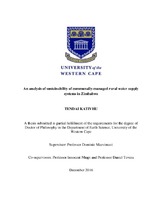| dc.contributor.advisor | Mazvimavi, Dominic | |
| dc.contributor.author | Kativhu, Tendai | |
| dc.date.accessioned | 2018-06-27T09:38:22Z | |
| dc.date.available | 2018-08-31T22:10:06Z | |
| dc.date.issued | 2016 | |
| dc.identifier.uri | http://hdl.handle.net/11394/6082 | |
| dc.description | Philosophiae Doctor - PhD (Earth Science) | |
| dc.description.abstract | Sustainability of rural water supply systems is a major development challenge in most
developing countries including Zimbabwe. This thesis aimed to analyse the sustainability of
communally managed rural water supply systems in Zimbabwe. Specifically, it determined the
factors influencing sustainability of water supply systems; investigated how the implementation
of Community Based Management (CBM) is contributing to the sustainability of water supply
systems; explored how multiple uses of water influence sustainability of water supply systems
under CBM and determined how the principal factors influencing sustainability and the CBM
implementation practices, can be incorporated at the different stages of the development of a
water supply system. The study was done in Nyanga, Chivi and Gwanda districts. A total of 399
communally- managed water points were studied and 300 households participated in the study.
Questionnaires were used to collect data from households and Water Point Committees (WPCs).
Data was also collected using Key Informant Interviews (KIIs) with a total of 33 key informants
being drawn from the national, district and community levels. | |
| dc.language.iso | en | |
| dc.publisher | University of the Western Cape | |
| dc.subject | Sustainability | |
| dc.subject | Communally-managed systems | |
| dc.subject | Water supply | |
| dc.subject | Rural areas | |
| dc.subject | Community based management | |
| dc.subject | Implementation | |
| dc.subject | Environment | |
| dc.subject | Zimbabwe | |
| dc.title | An analysis of sustainability of communally-managed rural water supply
systems in Zimbabwe | |
| dc.rights.holder | University of the Western Cape | |

